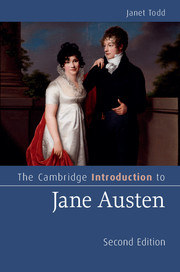Book contents
- Frontmatter
- Contents
- Preface to the second edition
- Preface to the first edition
- List of abbreviations
- 1 Life and times
- 2 The literary context
- 3 Northanger Abbey
- 4 Sense and Sensibility
- 5 Pride and Prejudice
- 6 Mansfield Park
- 7 Emma
- 8 Persuasion
- 9 Austenmania: Jane Austen's global life
- Afterword
- Notes
- Further reading
- Index
- Cambridge Introductions to …
8 - Persuasion
Published online by Cambridge University Press: 05 March 2015
- Frontmatter
- Contents
- Preface to the second edition
- Preface to the first edition
- List of abbreviations
- 1 Life and times
- 2 The literary context
- 3 Northanger Abbey
- 4 Sense and Sensibility
- 5 Pride and Prejudice
- 6 Mansfield Park
- 7 Emma
- 8 Persuasion
- 9 Austenmania: Jane Austen's global life
- Afterword
- Notes
- Further reading
- Index
- Cambridge Introductions to …
Summary
The accident of death makes Persuasion Jane Austen's final novel. It deserves its position by its innovative treatment of passion and rhetorical style as well as its development of those themes of memory and time, public and private history, inner and outer lives, language and literature, emotion and restraint that have marked all Austen's previous works. In its wistful longing to privatise a public state, it relates most to the concerns of Mansfield Park, while its depiction of emotional tumult recalls Sense and Sensibility.
Persuasion opens with ‘tangled, useless histories of the family in the first fifty pages’, as an exasperated Maria Edgeworth commented. This specific past with dates – unusual in Austen, and unexamined by the protagonists – roots the heroine within her elevated family's genealogy, which the novel progressively reveals as meaningless to her. Like the preceding works, Persuasion considers home and homecoming, but, where these move towards a new or renewed symbolic and physical home for the heroine, this last completed work begins with her ejection from the ancestral estate and ends with her understanding that home is not a place at all but an ambience, a company, and an acceptance of change. Considering the Burkean association of the nation with the hereditary estate, the perception qualifies the patriotism of British military victory which also emerges from the novel.
Jane Austen began work on Persuasion in August 1815, just as Napoleon sailed to exile in St Helena following his defeat at Waterloo. She ended the first draft in August 1816, when the initial excitement had subsided and the results of twenty-two years of war were being assessed: the economic cost – Britain had an immense national debt with high taxes to service it – and the political price of government-imposed national unity through years of patriotic propaganda and repression. If Mansfield Park might be termed a ‘state of the nation’ work, Persuasion might be a ‘Waterloo novel’, although the battle occurs outside its frame: Austen's contribution to the debate about the new society coming into being through peace. If so, again like Mansfield Park, the work expresses its vision obliquely, using the domestic relationships that must underpin, but may not easily influence, any civil and social order.
- Type
- Chapter
- Information
- The Cambridge Introduction to Jane Austen , pp. 122 - 141Publisher: Cambridge University PressPrint publication year: 2015

